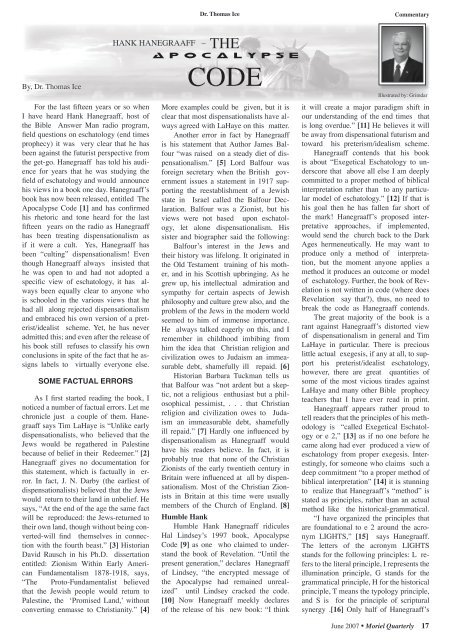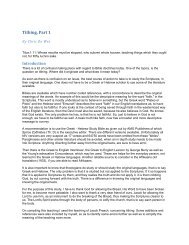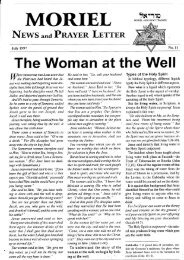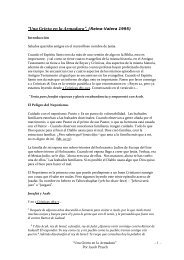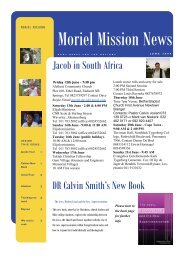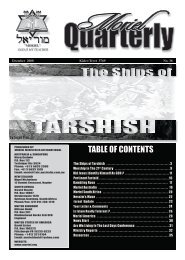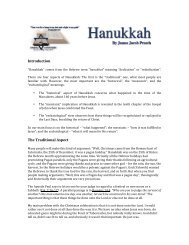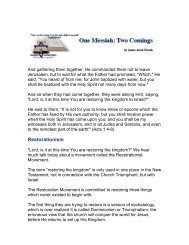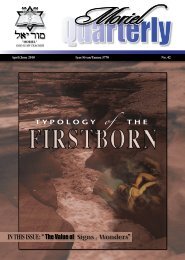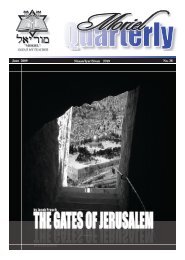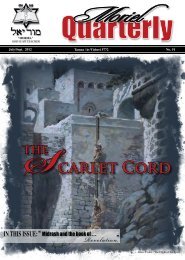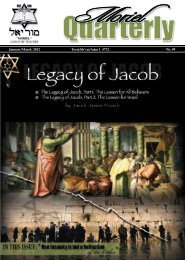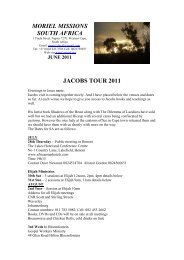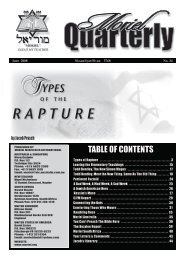Spiritual Warfare and Territorial Spirits (~5.5 MB) - Moriel Ministries
Spiritual Warfare and Territorial Spirits (~5.5 MB) - Moriel Ministries
Spiritual Warfare and Territorial Spirits (~5.5 MB) - Moriel Ministries
Create successful ePaper yourself
Turn your PDF publications into a flip-book with our unique Google optimized e-Paper software.
Dr. Thomas Ice CommentaryBy, Dr. Thomas IceFor the last fifteen years or so whenI have heard Hank Hanegraaff, host ofthe Bible Answer Man radio program,field questions on eschatology (end timesprophecy) it was very clear that he hasbeen against the futurist perspective fromthe get-go. Hanegraaff has told his audiencefor years that he was studying thefield of eschatology <strong>and</strong> would announcehis views in a book one day. Hanegraaff’sbook has now been released, entitled TheApocalypse Code [1] <strong>and</strong> has confirmedhis rhetoric <strong>and</strong> tone heard for the lastfifteen years on the radio as Hanegraaffhas been treating dispensationalism asif it were a cult. Yes, Hanegraaff hasbeen “culting” dispensationalism! Eventhough Hanegraaff always insisted thathe was open to <strong>and</strong> had not adopted aspecific view of eschatology, it has alwaysbeen equally clear to anyone whois schooled in the various views that hehad all along rejected dispensationalism<strong>and</strong> embraced his own version of a preterist/idealistscheme. Yet, he has neveradmitted this; <strong>and</strong> even after the release ofhis book still refuses to classify his ownconclusions in spite of the fact that he assignslabels to virtually everyone else.Some Factual ErrorsAs I first started reading the book, Inoticed a number of factual errors. Let mechronicle just a couple of them. Hanegraaffsays Tim LaHaye is “Unlike earlydispensationalists, who believed that theJews would be regathered in Palestinebecause of belief in their Redeemer.” [2]Hanegraaff gives no documentation forthis statement, which is factually in error.In fact, J. N. Darby (the earliest ofdispensationalists) believed that the Jewswould return to their l<strong>and</strong> in unbelief. Hesays, “At the end of the age the same factwill be reproduced: the Jews-returned totheir own l<strong>and</strong>, though without being converted-willfind themselves in connectionwith the fourth beast.” [3] HistorianDavid Rausch in his Ph.D. dissertationentitled: Zionism Within Early AmericanFundamentalism 1878-1918, says,“The Proto-Fundamentalist believedthat the Jewish people would return toPalestine, the ‘Promised L<strong>and</strong>,’ withoutconverting enmasse to Christianity.” [4]HANK HANEGRAAFF –THEA p o c a l y p s eCODEMore examples could be given, but it isclear that most dispensationalists have alwaysagreed with LaHaye on this matter.Another error in fact by Hanegraaffis his statement that Author James Balfour“was raised on a steady diet of dispensationalism.”[5] Lord Balfour wasforeign secretary when the British governmentissues a statement in 1917 supportingthe reestablishment of a Jewishstate in Israel called the Balfour Declaration.Balfour was a Zionist, but hisviews were not based upon eschatology,let alone dispensationalism. Hissister <strong>and</strong> biographer said the following:Balfour’s interest in the Jews <strong>and</strong>their history was lifelong. It originated inthe Old Testament training of his mother,<strong>and</strong> in his Scottish upbringing. As hegrew up, his intellectual admiration <strong>and</strong>sympathy for certain aspects of Jewishphilosophy <strong>and</strong> culture grew also, <strong>and</strong> theproblem of the Jews in the modern worldseemed to him of immense importance.He always talked eagerly on this, <strong>and</strong> Iremember in childhood imbibing fromhim the idea that Christian religion <strong>and</strong>civilization owes to Judaism an immeasurabledebt, shamefully ill repaid. [6]Historian Barbara Tuckman tells usthat Balfour was “not ardent but a skeptic,not a religious enthusiast but a philosophicalpessimist, . . . that Christianreligion <strong>and</strong> civilization owes to Judaisman immeasurable debt, shamefullyill repaid.” [7] Hardly one influenced bydispensationalism as Hanegraaff wouldhave his readers believe. In fact, it isprobably true that none of the ChristianZionists of the early twentieth century inBritain were influenced at all by dispensationalism.Most of the Christian Zionistsin Britain at this time were usuallymembers of the Church of Engl<strong>and</strong>. [8]Humble HankHumble Hank Hanegraaff ridiculesHal Lindsey’s 1997 book, ApocalypseCode [9] as one who claimed to underst<strong>and</strong>the book of Revelation. “Until thepresent generation,” declares Hanegraaffof Lindsey, “the encrypted message ofthe Apocalypse had remained unrealized”until Lindsey cracked the code.[10] Now Hanegraaff meekly declaresof the release of his new book: “I thinkIllustrated by: Grimdarit will create a major paradigm shift inour underst<strong>and</strong>ing of the end times thatis long overdue.” [11] He believes it willbe away from dispensational futurism <strong>and</strong>toward his preterism/idealism scheme.Hanegraaff contends that his bookis about “Exegetical Eschatology to underscorethat above all else I am deeplycommitted to a proper method of biblicalinterpretation rather than to any particularmodel of eschatology.” [12] If that ishis goal then he has fallen far short ofthe mark! Hanegraaff’s proposed interpretativeapproaches, if implemented,would send the church back to the DarkAges hermeneutically. He may want toproduce only a method of interpretation,but the moment anyone applies amethod it produces an outcome or modelof eschatology. Further, the book of Revelationis not written in code (where doesRevelation say that?), thus, no need tobreak the code as Hanegraaff contends.The great majority of the book is arant against Hanegraaff’s distorted viewof dispensationalism in general <strong>and</strong> TimLaHaye in particular. There is preciouslittle actual exegesis, if any at all, to supporthis preterist/idealist eschatology,however, there are great quantities ofsome of the most vicious tirades againstLaHaye <strong>and</strong> many other Bible prophecyteachers that I have ever read in print.Hanegraaff appears rather proud totell readers that the principles of his methodologyis “called Exegetical Eschatologyor e 2,” [13] as if no one before hecame along had ever produced a view ofeschatology from proper exegesis. Interestingly,for someone who claims such adeep commitment “to a proper method ofbiblical interpretation” [14] it is stunningto realize that Hanegraaff’s “method” isstated as principles, rather than an actualmethod like the historical-grammatical.“I have organized the principles thatare foundational to e 2 around the acronymLIGHTS,” [15] says Hanegraaff.The letters of the acronym LIGHTSst<strong>and</strong>s for the following principles: L refersto the literal principle, I represents theillumination principle, G st<strong>and</strong>s for thegrammatical principle, H for the historicalprinciple, T means the typology principle,<strong>and</strong> S is for the principle of scripturalsynergy .[16] Only half of Hanegraaff’sJune 2007 • <strong>Moriel</strong> Quarterly 17


